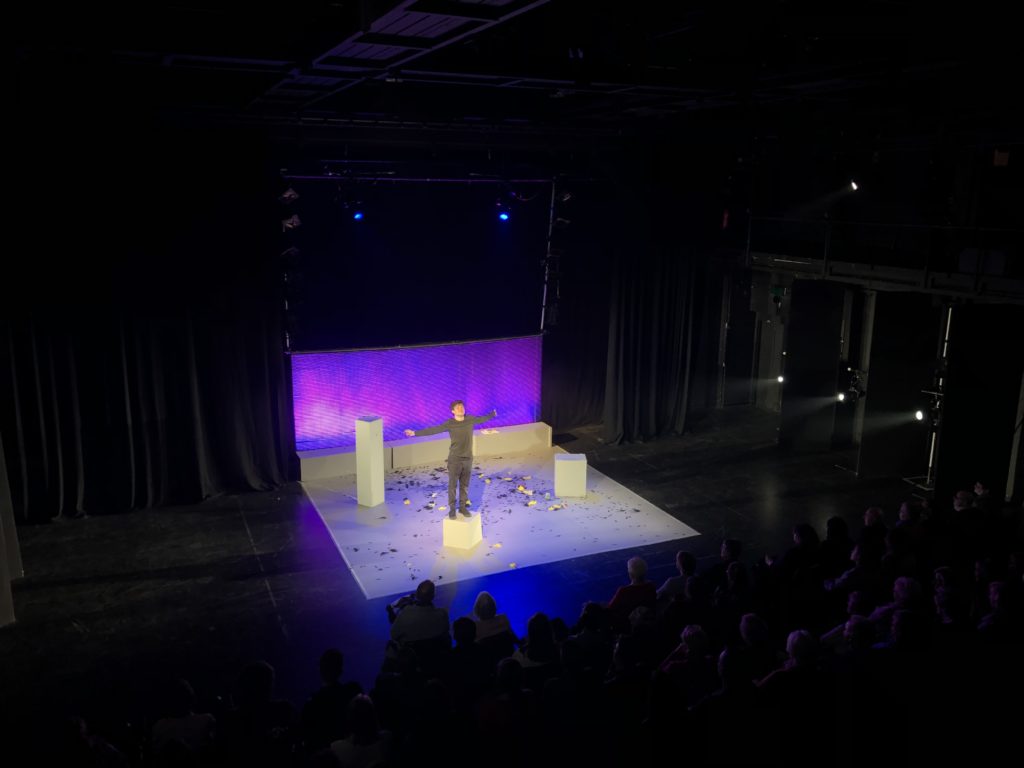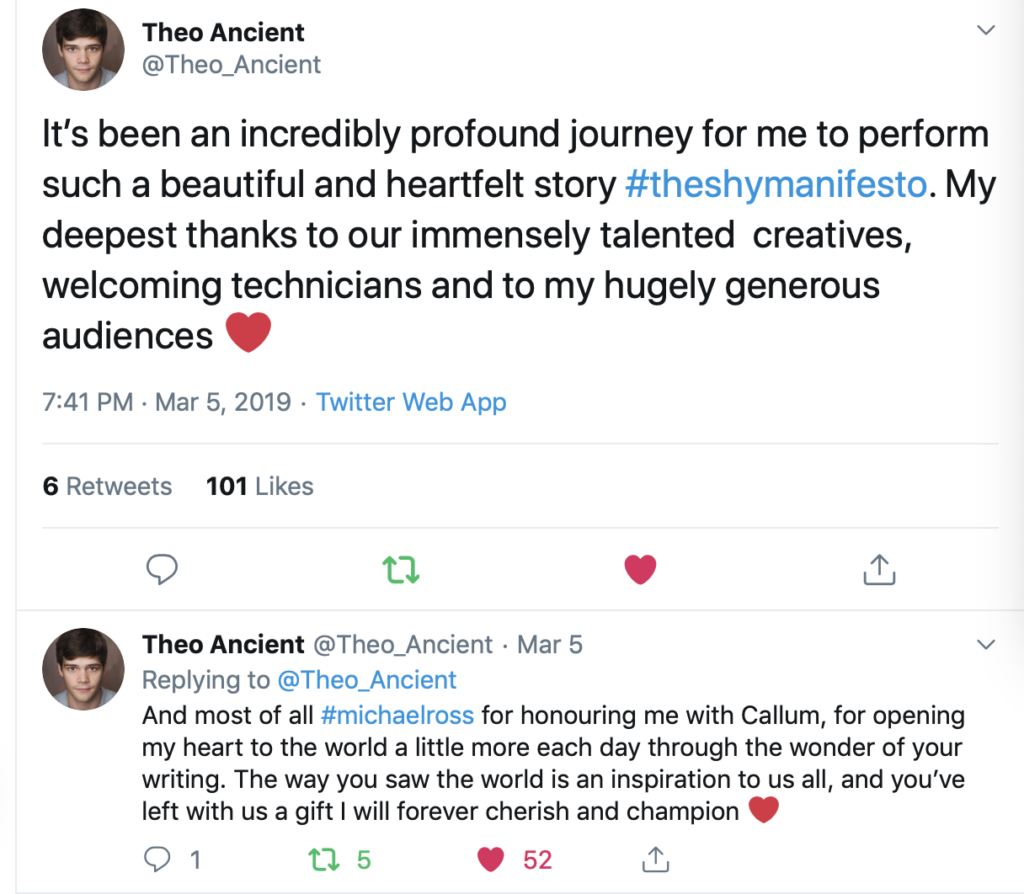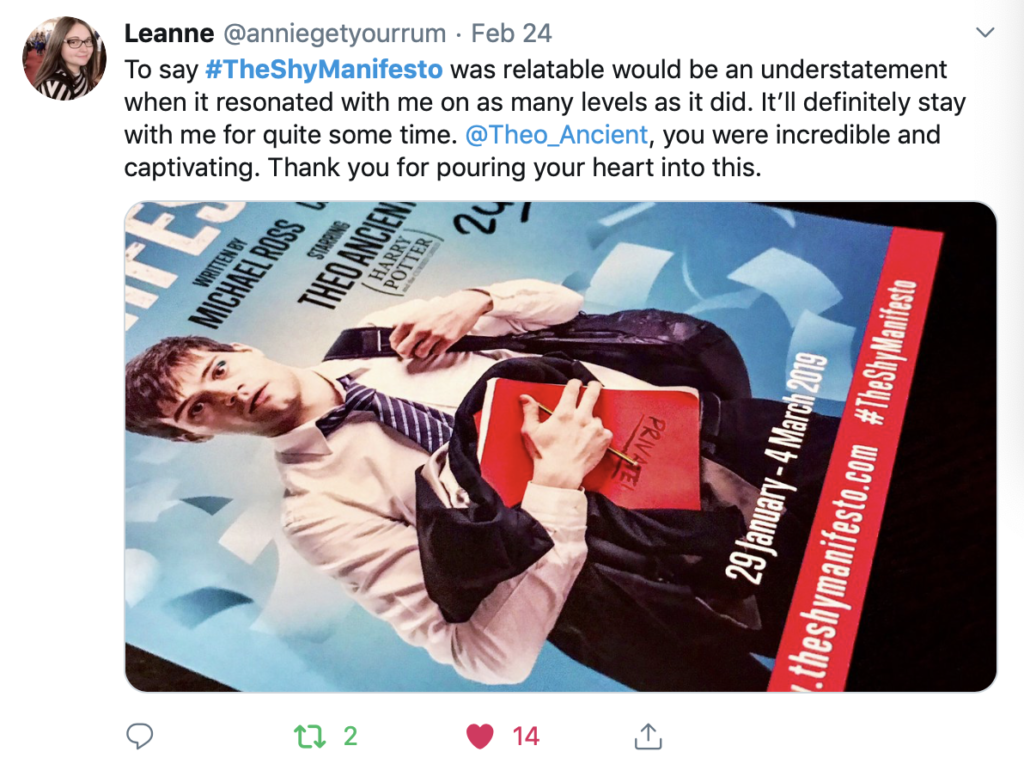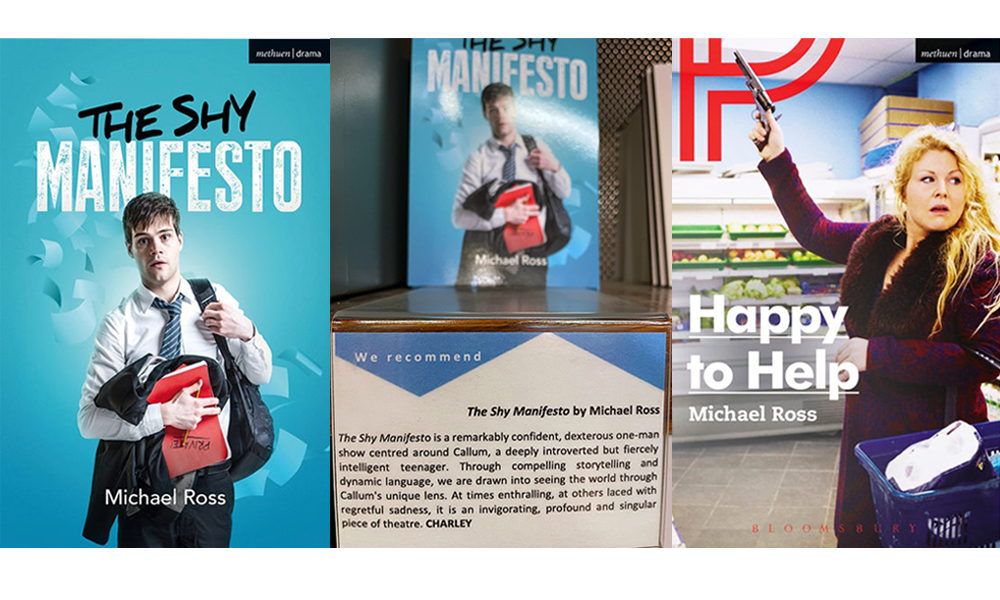
It’s a bittersweet coming-of-age comedy drama for one actor about a teenage boy who is proud to be shy and thinks you should be too, because what this crazy world needs right now is a bit more self restraint. Callum is to address an audience of radical shy comrades and incite the meek to finally rise up and inherit the earth, but memories of the previous night’s drunken escapades at end-of-term party keep intruding and threaten to upend the fragile identity he has created for himself.
Performed by Theo Ancient and directed by Cat Robey, the show was produced by Joe C Brown and Anthony Hollis and opened at Live Theatre, Newcastle on the 29th of January. It then went to Greenwich Theatre, Theatr Clwyd, The Met Manchester, The Marlowe Canterbury, Portsmouth Guildhall and Harrogate Theatre, amongst many others.









Top Reviews:
The Theatre Critic: The Shy Manifesto Review
Breaking The Fourth wall: The Shy Manifesto Review
Monstagigz: The Shy Manifesto Review
Onceaweektheatre: The Shy Manifesto Review
The Times: The Shy Manifesto Review
The Guardian: The Shy Manifesto Review
The Shy Manifesto was nominated for two awards :
Nominated for Monstagigz Best New Play of 2019
Nominated for Monstagigz Best Theatre Actor of 2019
An Interview with Michael Ross:
How did the show come about?
After writing the initial script, I was talking to Cat, the director, as we had worked together before and she was talking about doing something with Theo who we had both worked with together on my play The Utility People. I said I’d got a play that I thought would be perfect for him. Luckily when she and Theo both read the play they really liked it too and we were all enthusiastic to go ahead with it. We did a couple of workshop performances in 2017 and that led to the producers coming on board and the current tour.
What gave you the initial idea for the show?
The Shy Manifesto came to me as a title one day that sounded intrinsically funny; the idea of a very meek, timid person like myself fighting for a militant cause of being shy. But it was nothing more than a passing idea at the time. Then I thought later about what kind of manifesto and who would have written it and then the idea of the character of Callum came together and it seemed natural to make it a monologue because this is a character who would never be so articulate in real life.
What’s the hardest part about writing for the theatre?
The sheer amount of competition in the main buildings, companies and new writing venues. Its an uphill struggle when you are starting out if you don’t have a name so to speak and it can be heart-breaking when you get lots of rejections. You can set your sights quite high when you start out but after my first plays were rejected by some of the big new writing theatres I decided to send them to amateur and fringe companies. I started to see my work put on in front of an audience and that’s such a good lesson. You meet so many people this way through things like short play nights, indeed that was where I first met Cat which has led all the way to this working relationship over about 5 years. A play isn’t a novel so if it isn’t being performed you feel like it isn’t properly existing in its full form so it aways feels a failure if its not been put on stage so that’s what can be the hardest part.
What’s the best part of your job?
When it finally happens it is an amazing experience, when the play is brought to life by an amazing team of different people with all their amazing skills that I can’t do and its more than what you imagined but also completely true to what you imagined and what you wanted to convey. It can be a transcendental moment when it goes really well.
How did you become a writer?
I’ve always felt like I am a writer. I remember when I was seven I had this empty school exercise book and I filled it day by day with a story and I used to come down early on Saturday morning and write in it and I remember my dad coming downstairs and being surprised to see me there. That was the start of it really. I just loved telling stories and thinking up characters. I’m always wary of people who say they became a writer because they wanted to challenge social injustice or they wanted to change the world, I think those are admirable things to want to do but I think for a true writer its really the joy of imagination and being playful and creative. I’ve always felt like I’m naturally a writer and I’m happier when I am writing and I’m always much happier when I’ve got something I’m working on and enjoying.
What’s the scariest thing about opening night for you?
Plays at that point are always out of my control and there’s sometimes technical things that don’t work, but what I worry about most is if it will turn out to be a dud and if my writing will get no laughs or there will be no rapt response from the audience because you just never really know. The added scariness of this tour is that I just don’t know how different places are going to respond to something that I wrote and whether they will get the humour. I am hoping the story is universal and that it will reach out to people in different places. That’s the scariest thing, you want people to like the play and enjoy the play and I am hoping they do.
How much control does the writer have over the play once rehearsals begin?
In theatre its much better than the film industry where sometimes writers have been banned from film sets. In British theatre there’s more of a respect for the writer which I think is good. Its important to work with a director who is on the same page as you’ll both get the best play and experience out of it. If a director says they want to do your play but then they want to change loads, well, they don’t really want to do your play. In this experience and for many of my experiences I feel like I’ve had a real rapport with the director and we’re not treading on each other’s toes.
What are you most proud of in this show?
When we did a couple of early performances back in 2017 of an earlier draft, I was really moved by how people emotionally responded to Callum’s story. That was unusual for me as lots of my plays have been praised for their humour and satire but I’d never had the experience of people – some people were crying when they saw the play and saying that it really spoke to them and really talked about their life. I was really touched by that and I thought then that this was a play I should continue with and pursue.
What do you want people to be thinking when they leave the theatre after seeing your show?
Although the character of Callum is didactic, and his idea of a manifesto is didactic, I don’t think the play is. I think the play presents to you a character with this very strong point of view but it also shows you through the story that he is not always a reliable narrator and that actually, you know, there are drawbacks to the shy life as well as upsides. So it’s not simply saying something positive or negative and hopefully I’m leaving it up to the audience to talk about it and decide whether they think Callum is tragic or is he defiant and true to himself? I think there might be debate about that and I like that and I think that is true to the play.

